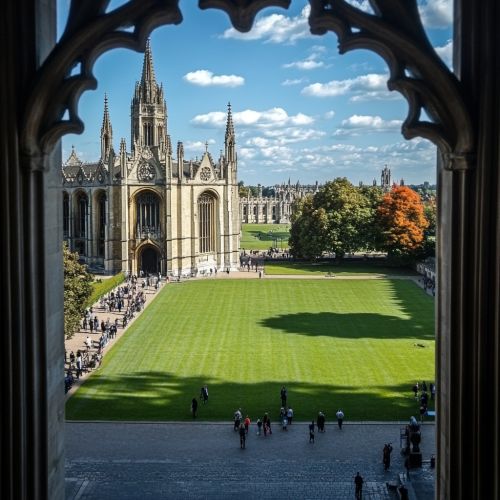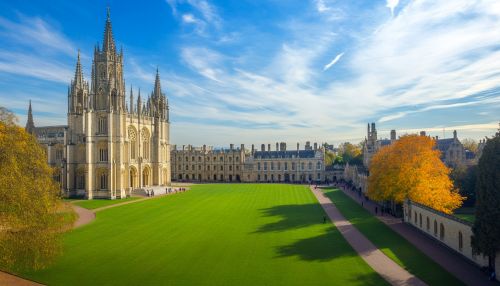King's College: Difference between revisions
(Created page with "== Introduction == King's College is a term that can refer to several educational institutions across the globe, each with its own unique history, academic offerings, and cultural significance. This article will explore various King's Colleges, delving into their origins, development, and contributions to education. The focus will be on providing a comprehensive overview of these institutions, highlighting their distinctive features and roles within the academic communi...") |
No edit summary |
||
| (One intermediate revision by the same user not shown) | |||
| Line 11: | Line 11: | ||
One of the most renowned King's Colleges is [[King's College, Cambridge]], founded in 1441 by King Henry VI. It is part of the University of Cambridge, one of the oldest and most prestigious universities in the world. The college is known for its stunning Gothic architecture, particularly the King's College Chapel, which is a masterpiece of English Perpendicular Gothic design. | One of the most renowned King's Colleges is [[King's College, Cambridge]], founded in 1441 by King Henry VI. It is part of the University of Cambridge, one of the oldest and most prestigious universities in the world. The college is known for its stunning Gothic architecture, particularly the King's College Chapel, which is a masterpiece of English Perpendicular Gothic design. | ||
[[Image:Detail-98847.jpg|thumb|center|A view of King's College Chapel, Cambridge, with its Gothic architecture and expansive lawn.|class=only_on_mobile]] | |||
[[Image:Detail-98848.jpg|thumb|center|A view of King's College Chapel, Cambridge, with its Gothic architecture and expansive lawn.|class=only_on_desktop]] | |||
King's College, Cambridge, has a rich academic tradition, offering undergraduate and postgraduate programs across various disciplines. It is particularly noted for its contributions to the fields of mathematics, natural sciences, and humanities. The college's alumni include many notable figures, such as economist John Maynard Keynes and writer E.M. Forster. | King's College, Cambridge, has a rich academic tradition, offering undergraduate and postgraduate programs across various disciplines. It is particularly noted for its contributions to the fields of mathematics, natural sciences, and humanities. The college's alumni include many notable figures, such as economist John Maynard Keynes and writer E.M. Forster. | ||
Latest revision as of 19:45, 20 October 2024
Introduction
King's College is a term that can refer to several educational institutions across the globe, each with its own unique history, academic offerings, and cultural significance. This article will explore various King's Colleges, delving into their origins, development, and contributions to education. The focus will be on providing a comprehensive overview of these institutions, highlighting their distinctive features and roles within the academic community.
Historical Background
The concept of a "King's College" dates back to medieval times when monarchs played a significant role in the establishment and patronage of educational institutions. These colleges were often founded to promote religious education and train clergy, reflecting the close ties between the church and the monarchy. Over time, the scope of these institutions expanded to include a broader range of academic disciplines.
King's College, Cambridge
One of the most renowned King's Colleges is King's College, Cambridge, founded in 1441 by King Henry VI. It is part of the University of Cambridge, one of the oldest and most prestigious universities in the world. The college is known for its stunning Gothic architecture, particularly the King's College Chapel, which is a masterpiece of English Perpendicular Gothic design.


King's College, Cambridge, has a rich academic tradition, offering undergraduate and postgraduate programs across various disciplines. It is particularly noted for its contributions to the fields of mathematics, natural sciences, and humanities. The college's alumni include many notable figures, such as economist John Maynard Keynes and writer E.M. Forster.
King's College London
King's College London was established in 1829 by King George IV and the Duke of Wellington. It is one of the founding colleges of the University of London and has grown to become one of the leading research universities in the United Kingdom. The college is known for its strong emphasis on research and innovation, with significant contributions to fields such as medicine, law, and the humanities.
King's College London has a diverse student body, with students from over 150 countries. It offers a wide range of undergraduate and postgraduate programs, and its research output is recognized globally. The college's notable alumni include Nobel laureates, government leaders, and influential academics.
Academic Structure
The academic structure of King's Colleges varies depending on the institution, but they generally follow a collegiate system, which is characteristic of many traditional universities in the UK. This system allows for a unique blend of centralized university administration and decentralized college governance.
Collegiate System
In a collegiate system, each college operates as an independent entity within the larger university framework. This allows colleges to maintain their own traditions, manage their own finances, and provide tailored support to their students. The system fosters a sense of community and belonging among students and faculty, enhancing the overall educational experience.
Academic Programs
King's Colleges offer a wide range of academic programs, from undergraduate degrees to doctoral research. The curriculum is often designed to encourage interdisciplinary study, allowing students to explore multiple fields of interest. Many King's Colleges are known for their rigorous academic standards and emphasis on critical thinking and independent research.
Cultural and Social Impact
King's Colleges have played a significant role in shaping the cultural and social landscape of their respective regions. They have been centers of intellectual and cultural exchange, attracting scholars and students from around the world.
Contributions to Society
The contributions of King's Colleges to society are manifold. They have been instrumental in advancing knowledge and innovation, particularly in fields such as science, technology, and medicine. Their research has led to breakthroughs that have had a profound impact on society, from medical advancements to technological innovations.
Cultural Heritage
Many King's Colleges are steeped in cultural heritage, with historic buildings and traditions that date back centuries. These institutions often serve as custodians of cultural and historical artifacts, preserving them for future generations. They also host a variety of cultural events, from concerts and exhibitions to lectures and conferences, enriching the cultural life of their communities.
Notable Alumni
King's Colleges have produced a remarkable array of alumni who have made significant contributions to various fields. These individuals have gone on to become leaders in academia, politics, business, and the arts.
Influential Figures
Notable alumni from King's Colleges include:
- John Maynard Keynes, an influential economist known for his work on macroeconomic theory. - Desmond Tutu, a Nobel Peace Prize laureate and prominent anti-apartheid activist. - Virginia Woolf, a renowned writer and key figure in the modernist literary movement.
These individuals exemplify the diverse talents and achievements of King's College alumni, highlighting the institutions' role in nurturing leaders and innovators.
Challenges and Opportunities
Like many educational institutions, King's Colleges face a range of challenges and opportunities in the modern era. These include adapting to technological advancements, addressing issues of diversity and inclusion, and navigating the complexities of global education.
Technological Advancements
The rapid pace of technological change presents both challenges and opportunities for King's Colleges. On one hand, technology offers new tools for teaching and research, enabling more interactive and personalized learning experiences. On the other hand, it requires institutions to continuously update their infrastructure and curricula to keep pace with advancements.
Diversity and Inclusion
Promoting diversity and inclusion is a key priority for many King's Colleges. These institutions are committed to creating an inclusive environment that values and respects individuals from all backgrounds. Efforts to enhance diversity include outreach programs, scholarships, and initiatives to support underrepresented groups.
Conclusion
King's Colleges represent a rich tapestry of history, academic excellence, and cultural significance. They have been at the forefront of education and research for centuries, contributing to the advancement of knowledge and the betterment of society. As they continue to evolve, these institutions remain committed to their core mission of providing high-quality education and fostering intellectual curiosity.
See Also
- University of Cambridge - University of London - Collegiate System - Gothic Architecture - Nobel Laureates
